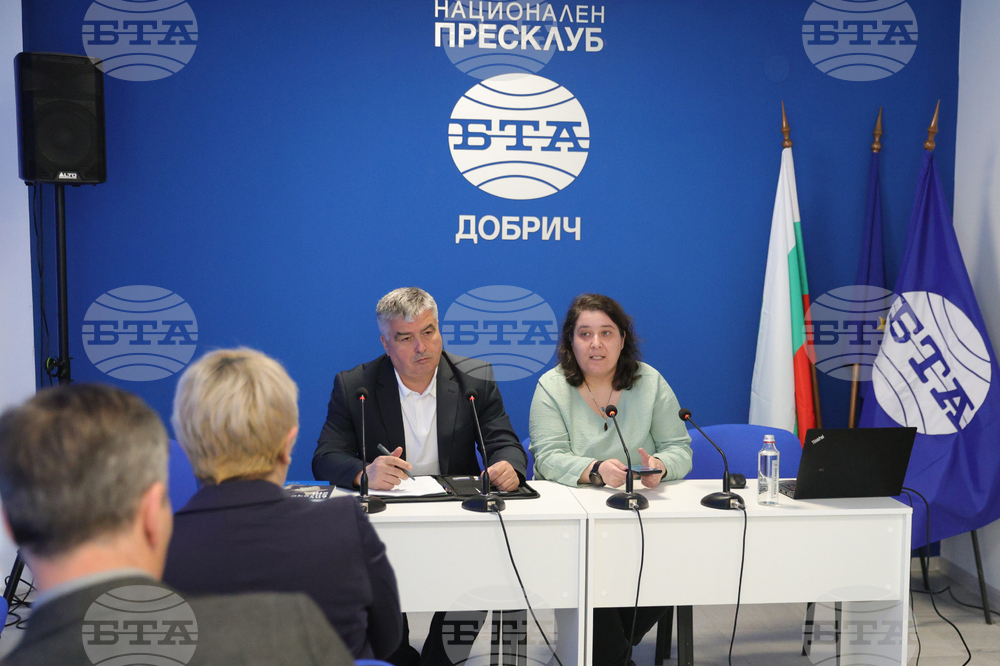site.btaBTA's Europe on Balkans Conference Held in Dobrich


Representatives of various sectors who have worked on projects supported by the EU Cohesion Policy participated in a conference at the National Press Club of the Bulgarian News Agency (BTA) in Dobrich on Tuesday. The event was part of BTA's "Europe on Balkans: Cohesion Skills" project.
With the accession of Bulgaria and Romania to the EU, the Union gained one of Europe’s most fertile regions – Dobrudzha – said BTA Director General Kiril Valchev. He noted that this is why Earth Day was chosen for the conference, highlighting the agricultural importance of the region. Citing Eurostat data, he noted that fewer than ten EU countries produce up to 85% of the Union's staple foods. Bulgaria and Romania, he stressed, are key contributors to EU food security, with Dobrudzha playing a vital role. In Southern Dobrudzha, 98.8% of agricultural land is arable - the highest share in Bulgaria. Moreover, the food industry in the Dobrich Region accounts for 48% of local industrial production.
Education is crucial for regional development, as every company considering investment in Dobrich and the surrounding area is asking where they will find qualified workers, said Dobrich Deputy Mayor Pavel Pavlov. He stressed that the municipal administration, along with kindergartens and schools operating as secondary budget spenders, are actively involved in numerous national programme projects. “The municipality takes advantage of every opportunity to upgrade educational infrastructure, because we understand that quality education depends on solid material conditions,” he said. Current projects under the National Recovery and Resilience Plan will allow three kindergartens and two schools to improve their facilities. In addition, the municipality is pursuing initiatives that promote equal access to education, Pavlov added.
In recent years, instead of expanding the dual education system of learning while working, schools in Dobrich Region have been forced to limit it, said Svetlana Vasileva, Head of the Regional Department of Education in Dobrich. "I hope that the concept for Integrated Territorial Investments (ITI) of the Dobrich Municipality will find the best implementation in order to enable the development of dual education in our region as a whole", she emphasised, adding that the limitation of dual education is related to many conditions and factors, but mostly to the ability of employers to accept students in this form of education in their companies. "Although the dual form has not yet sufficiently entered our education in Dobrich Region, the teaching practices on the other hand allow for the development of students in this direction," Vasileva pointed out. She noted that Dobrich Municipality did not divide schools into state and municipal schools when developing the ITI concepts.
The year 2025 will be very busy in terms of applying for funding for projects related to education, Regional Information Centre Manager Genoveva Drumeva said. She noted that so far, three contracts have been concluded in the region under the European Union's Education programme, which are being implemented by the municipalities of Dobrich, Dobrichka and Shabla. Drumeva presented data, according to which 1,555 people from marginalized communities are expected to be included in these projects. Over 370 children with Bulgarian as their mother tongue and over 80 pedagogical specialists will be participants in the activities, with 848 parents also to be involved in the projects.
17 training programmes with 80 trainees have launched in Dobrich Region under the Recovery and Resilience Plan (RRP), said Atanas Yordanov, Head of the Intermediary Services Department at the Dobrich Labour Bureau Directorate. He specified that 10 of the trainings are for 79 unemployed people, and 101 employed people are engaged in the remaining seven trainings. The training vouchers issued for the bureau are 551 in total. Yordanov pointed out that the vouchers under the RRP are for improving digital competence for basic and intermediate levels, according to the European Digital Competence Framework.
BTA's Europe on Balkans: Cohesion Skills project aims to raise public awareness and foster open dialogue about cohesion policy, local achievements, and the implementation of the EU's policy priorities. The project kicked off with a conference in Veliki Preslav in November 2024. The schedule of conferences until the end of September 2025 includes events in the following cities: Blagoevgrad, Burgas, Varna, Veliko Tarnovo, Vidin, Vratsa, Gabrovo, Dobrich, Kazanlak, Kardzhali, Kyustendil, Lovech, Montana, Pazardzhik, Pernik, Pleven, Razgrad, Ruse, Samokov, Svishtov, Sliven, Smolyan, Sofia, Stara Zagora, Troyan, Targovishte, Haskovo, Shumen, and Yambol. Cross-border conferences will be held in Belgrade, Bosilegrad, Bucharest, Edirne, Skopje, and Thessaloniki. The project builds on the Europe in the Balkans: A Common Future and Europe in Bulgaria: A Common Future projects, implemented by BTA in 2023 and 2024, respectively.
/NF/
Additional
news.modal.image.header
news.modal.image.text
news.modal.download.header
news.modal.download.text
news.modal.header
news.modal.text













